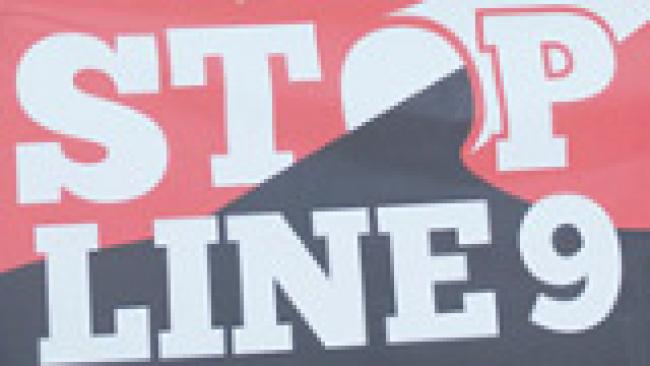Articles Menu

Rabble.ca published an article earlier this week by Toronto writer and climate activist Jesse McLlaren that looks ahead to next week's convention of the Ontario Federation of Labour and an anticipated debate over the proposed ‘reversal’ of the Line 9 pipeline in the province. Enbridge Inc wants the line to carry Alberta tar sands bitumen to refineries in Montreal and possibly to the Atlantic coast and export markets. Presently, the line runs across southern Ontario, including through the city of Toronto.
The article is titled, 'Six reasons some labour is coming out against tar sands pipelines'. It’s an informative summary of the working class argument against the fossil fuel industry and will help equip delegates at the OFL convention to understand and debate the issue.
McLaren lists six, compelling, environmental and social reasons why workers and unions should oppose Line 9. The pipeline will not be safe; the regulatory process to approve it is skimpy; it will not create very many jobs, particularly considering the amount of private and public funds that will be spent to build it; the cleanup of the inevitable spills from the line will be costly; and the line will be another major enabler of increased greenhouse gas emissions in the world.
An additional reason for opposing Line 9 is the fact that this project, like virtually every other fossil fuel-related project in Canada constitutes a violation of First Nations sovereignty rights because it will be built on or near recognized or unceded Indigenous territories. Though not listed as one of the article’s ‘six reasons’, the writer does explain this important part of the story.
The article falls short in one area. It does not explain where the unions in Canada actually stand on climate and fossil fuel issues today. The specific actions that union activists should consider undertaking, therefore, is left less clear than might otherwise be the case.
It is true that some unions are coming out in opposition to the Alberta tar sands and to Line 9. But the union movement as a whole in Canada is deeply divided on fossil fuel and climate issues. Unifor and other key industrial unions support Line 9 as well as the proposed, mega-tar sands pipeline (‘Energy East’) that would cross Canada from Alberta all the way to Montreal and the east coast of Canada and the U.S. (See the article by Herman Rosenfeld responding to Unifor’s support of Line 9 that is reprinted in this newsletter from The Bullet.)
Provincial federations of labour in Alberta and British Columbia as well as the Canadian Labour Congress have effectively come down on the side of their pro-pipeline affiliates by virtue of their failure to oppose the Alberta tar sands which the environmental universally opposes and First Nations near-universally oppose.
The unions' political party, the NDP, supports Energy East. Its BC wing is avoiding a stand on one of the two tar sands lines proposed in British Columbia—Trans Mountain.
Those unions (typically in the public sector) that are beginning to challenge the fossil fuel future of industry and the federal government have a tough fight on their hands in winning the union movement as a whole to a sustainable future.
McLaren concludes the article with a lengthy quote from the speech delivered by writer Naomi Klein to the founding convention of the Unifor union in September. It was a fine speech that challenged the new union to join the burgeoning pro-environment, pro-human race movement. Klein's words were met with a standing ovation at the convention, but the leadership of Unifor is headed in the opposite direction in its fossil fuel and transportation policies.
In British Columbia, the Northern Gateway tar sands pipeline that would cross BC to the northern coast has drawn fierce and near universal opposition. But opposition to the other tar sands line--Kinder Morgan's proposal to triple the capacity of its existing, Trans Mountain route into Vancouver harbour--is muted. Outgoing BC NDP leader Adrian Dix was roundly condemned by leading officials and industrial union affiliates in his party, including the construction unions and the Steelworkers, for taking a stand against that line during the election last spring in which the NDP suffered an unexpected loss.
At a rally of 4,000 or so people against Northern Gateway held in Vancouver on Nov. 16, there was no union presence. The rally was one of dozens of actions that day across Canada against fossil fuel pipelines. Jesse McLaren’s article is a timely call for debate and action by unions, not only in Ontario but right across the country.